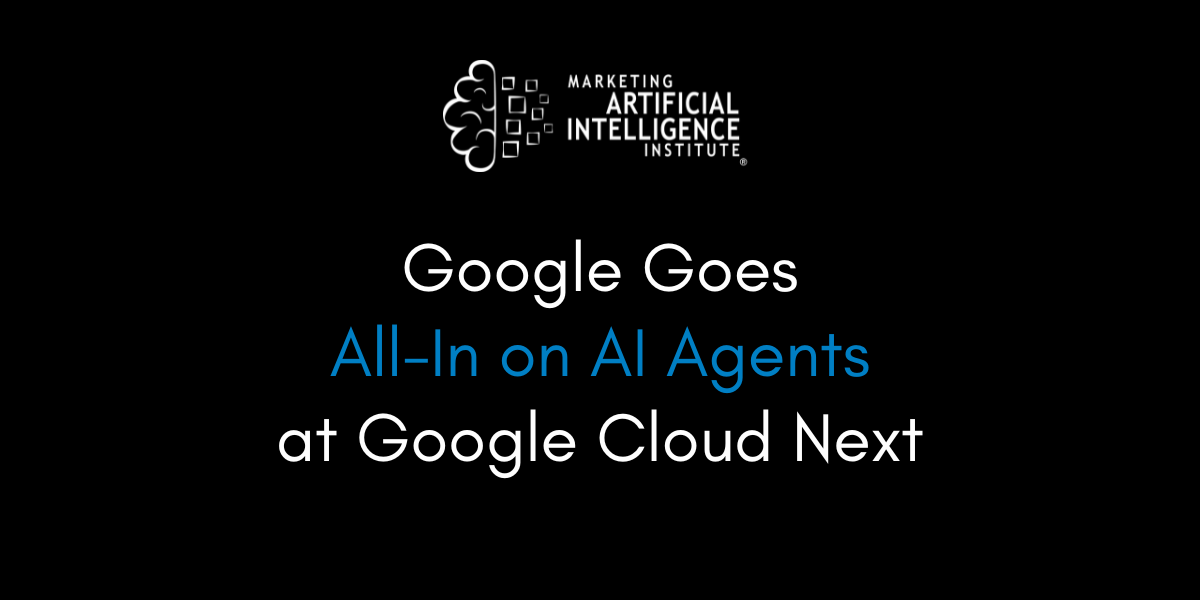Google just made some big announcements about AI agents.
The tech giant wrapped up its Google Cloud Next event, a major conference. At the conference, Google announced tons of new updates on AI models, chips, and products.
(Including a big expansion of Gemini into Google Cloud and Google Workspace products.)
But the starring role, really, went to AI agents.
In his keynote, Google Cloud CEO Thomas Kurian talked up AI agents "that take action to help you achieve specific goals" and "connect with other agents" to get work done.
He even unveiled the 6 types of AI agents that Google sees dominating the future...
And a no-code way to build some of them through the new Vertex AI Agent Builder.
In fact, there were a few key things that came out of Google Cloud Next you really need to pay attention to.
On Episode 92 of The Artificial Intelligence Show, I discovered which ones matter most for business leaders by talking to Marketing AI Institute founder / CEO Paul Roetzer.
6 types of AI agents will define the future
As part of his keynote, Kurian outlined 6 types of AI agents that Google is building. By understanding these types of agents, you can start to get a glimpse of the future, says Roetzer.
“You can listen to some of these descriptions and start to imagine where agents can do the work of some humans," he says.
The 6 types of AI agents are as follows:
- Customer Agents. Agents that can listen, understand needs, and make recommendations. Just like a great sales or service person would. They work across channels and get integrated into product experiences.
- Employee Agents. Agents that help workers be more productive and collaborate better. They do this by streamlining repetitive tasks, answering questions, and editing communications.
- Creative Agents. Agents that help anyone "become a designer, artist, or producer." These agents support creative design and marketing tasks.
- Data Agents. Agents that act as knowledgable analysts and researchers. They'll answer questions, synthesize research, and ask questions you haven't thought to ask.
- Code Agents. Agents that support developers in their work building and maintaining applications and systems.
- Security Agents. Agents that assist security operations professionals by automating monitoring tasks and protecting data.
In a blog post, Google shared 100+ examples of companies already using these agents in the real world.
Not to mention, Google wants you to be able to build these agents for yourself. That's what they want to enable using Vertex AI Agent Builder. Agent Builder is certainly promising. But has a long way to go.
“I keep waiting for the ChatGPT moment for no-code, where I have an idea for an app and can just go build it," says Roetzer. "In my initial experience, that is not what this is.”
You still need technical know-how to use it effectively.
How far away are we from AI agents?
So, how far away are we from a fully AI agent powered future?
Recently, Roetzer has been mapping out a tentative timeline for future AI development. And AI agents are a major milestone in that timeline.
You can read the full timeline here. In it, Roetzer predicts an explosion in the power and use of AI agents between 2025-2027.
But he cautions that it's still early. AI agents aren't totally here yet. Lots of manual work is still required to get them to work right. And they're nowhere near full autonomy.
Yet the space is moving fast. By 2025, Roetzer predicts AI will take action with limited oversight. This will probably start in select domains and verticals. Then it will go more generally horizontal. When this happens, it begins to really impact knowledge work, he says.
“Disruption to knowledge work starts to become more tangible and measurable.”
This impact was on display at Google Cloud Next. In one segment, Uber's CEO said that AI agents are helping the firm be more productive and effective. But he also said building AI agents "reduces our agency spending."
That leads to more efficiencies for Uber. But certainly less work for their agencies.
“Sometimes they’re saying the quiet part out loud," notes Roetzer.
Google isn't the only one building AI agents
It's important to understand that Google isn't the only one building AI agents.
"Everybody's building the same stuff," says Roetzer. "What Google’s doing is trying to productize specific sorts of agents. They’re trying to make use cases really obvious to people so they can commercialize this faster. It’s all just Gemini. It’s all the base models applied in different ways.”
That means every center of AI talent in Silicon Valley and beyond is racing towards AI agents.
True AI agent disruption may be a few years away. But now is the time to start planning. AI agents are going to affect your use of agencies, staffing, upskilling, and more at your company.
“These agents are going to become more and more a part of what we do," says Roetzer. "It’s going to have a major impact on everything.”
Mike Kaput
As Chief Content Officer, Mike Kaput uses content marketing, marketing strategy, and marketing technology to grow and scale traffic, leads, and revenue for Marketing AI Institute. Mike is the co-author of Marketing Artificial Intelligence: AI, Marketing and the Future of Business (Matt Holt Books, 2022). See Mike's full bio.



